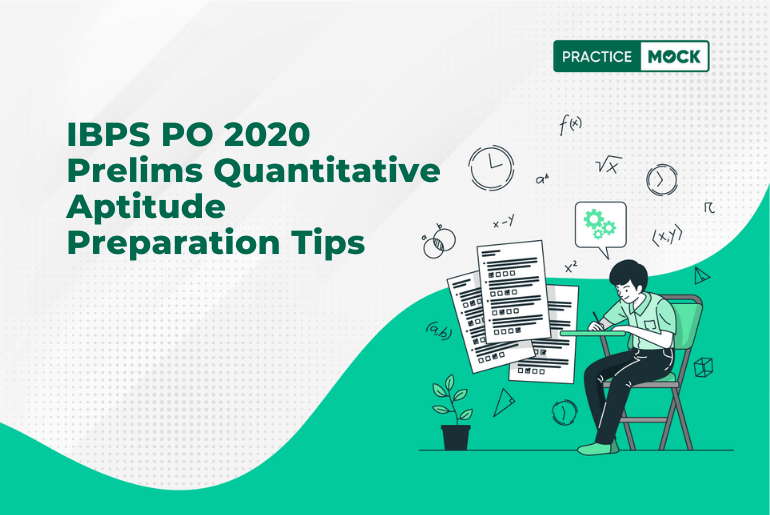IBPS PO 2020 Prelims Preparation Tips: The Institute of Banking Personnel Selection (IBPS) Probationary Officer (PO) exam is a highly competitive examination, and the Quantitative Aptitude section plays a crucial role in determining a candidate’s success. Here are some effective preparation tips to ace the IBPS PO 2020 Prelims Quantitative Aptitude section.
Understand the Syllabus:
Begin your preparation by thoroughly understanding the Quantitative Aptitude syllabus for IBPS PO 2020 Prelims. The syllabus typically includes topics such as Number Series, Simplification, Data Interpretation, Quadratic Equations, and Arithmetic problems involving time and work, percentages, profit and loss, etc. A clear understanding of the syllabus will help you plan your study schedule strategically.
Create a Study Schedule:
Devise a well-organized study schedule that allocates sufficient time to each topic within the Quantitative Aptitude section. Ensure that you cover all the essential topics and leave no room for last-minute cramming. A consistent and disciplined study routine is key to mastering the quantitative aptitude skills required for the IBPS PO exam.
Focus on Basics and Fundamentals:
Before delving into complex problem-solving techniques, build a strong foundation by mastering the basics and fundamentals of each topic. Understand the underlying concepts thoroughly, as this knowledge will serve as a solid framework when attempting more challenging questions in the IBPS PO Prelims exam.
Practice Regularly with Mock Tests:
Practice is paramount for success in the Quantitative Aptitude section. Take advantage of IBPS PO mock tests available online. Regular practice with mock tests not only helps you get accustomed to the exam pattern but also enhances your time management skills. Identify your weak areas and work on improving them through targeted practice.
Time Management is Key:
Efficient time management is crucial during the IBPS PO Prelims exam. Allocate a specific amount of time to each question while practicing, and gradually work on reducing the time taken for each question. This will ensure that you can attempt the maximum number of questions within the stipulated time during the actual exam.
Review and Analyze:
After each practice session or mock test, review your performance critically. Analyze the mistakes you make and understand the correct approach to solving each problem. Regular review and analysis will help you fine-tune your strategy and avoid repeating the same errors in the actual exam.
Stay Updated with Exam Patterns:
Keep yourself updated with any changes in the IBPS PO exam pattern or question format. This awareness will help you tailor your preparation strategy according to the evolving requirements of the examination, ensuring that you are well-prepared for any surprises that may arise in the Quantitative Aptitude section.
Seek Guidance if Needed:
If you encounter difficulties in understanding certain topics or solving specific types of problems, don’t hesitate to seek guidance from teachers, mentors, or online resources. Clarifying doubts and seeking expert advice can significantly boost your confidence and competence in the Quantitative Aptitude section.
In conclusion, a systematic and focused approach to preparing for the Quantitative Aptitude section of IBPS PO 2020 Prelims is essential. By following these preparation tips, candidates can enhance their quantitative aptitude skills and increase their chances of success in this competitive banking examination.
- Sign Up on Practicemock for Updated Current Affairs, Free Topic Tests and Free Mini Mocks
- Sign Up Here to Download Free Study Material
Free Mock Tests for the Upcoming Exams
- IBPS PO Free Mock Test 2024
- RBI Grade B Free Mock Test 2024
- IBPS SO Free Mock Test 2024
- NABARD Grade A Free Mock Test 2024
- SSC CGL Free Mock Test 2024
- IBPS Clerk Free Mock Test 2024
- IBPS RRB PO Free Mock Test 2024
- IBPS RRB Clerk Free Mock Test 2024
- RRB NTPC Free Mock Test 2024
- SSC MTS Free Mock Test 2024
- SSC Strenographer Free Mock Test 2024
- GATE Mechanical Free Mock Test 2024
- GATE Civil Free Mock Test 2024
- RRB ALP Free Mock Test 2024
- SSC CPO Free Mock Test 2024
- AFCAT Free Mock Test 2024
- SEBI Grade A Free Mock Test 2024
- IFSCA Grade A Free Mock Test 2024
- RRB JE Free Mock Test 2024
- Free Banking Live Test
- Free SSC Live Test


